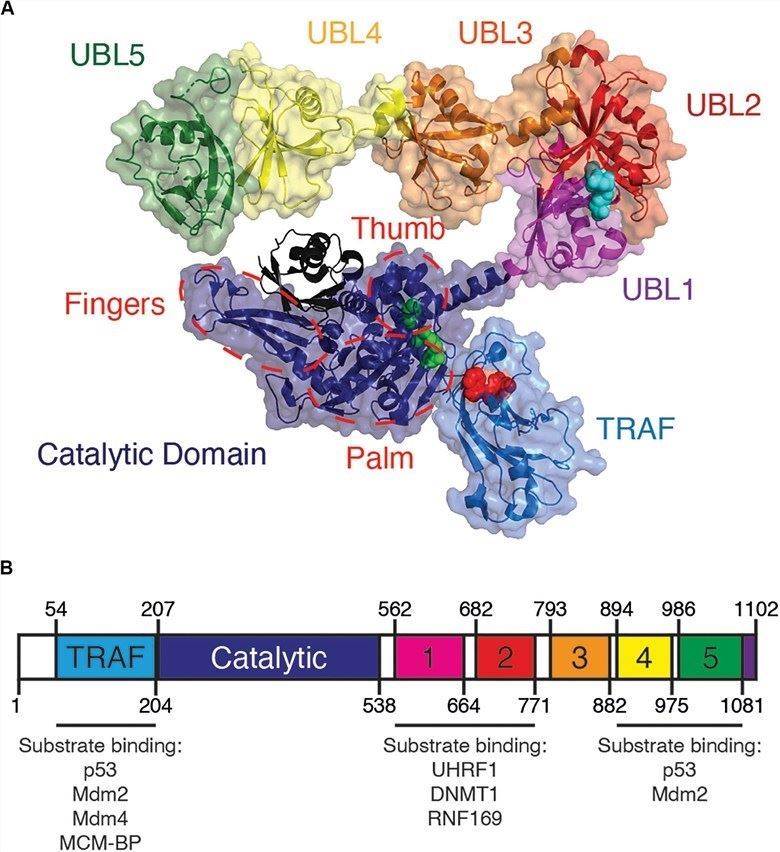What is USP7 Protein
USP7 protein belongs to the ubiquitin-specific protease (USP) family, which is a group of deubiquitinating enzymes (DUBs) responsible for removing ubiquitin molecules from target proteins, thereby altering the outcome of ubiquitination - a process that regulates the degradation and function of intracellular proteins. The importance of USP7 lies in its functionality and involvement in several essential physiological processes.

Fig1. Overview of USP7 domain structure (Valles, G. J. et al. 2020)
Function of USP7 protein
The function of the USP7 protein is versatile, reflecting its involvement in an array of molecular and cellular processes. It plays pivotal roles in the regulation of cell proliferation, apoptosis, DNA repair, and immunity. USP7 achieves these cellular effects primarily through its ability to deubiquitinate and stabilize critical regulatory proteins such as p53, Mdm2, PTEN, and FoxO, each of which has a unique role in an array of cellular processes. Generally speaking, the USP7 protein works as a stabilizer for other vital proteins, therefore playing a substantial role in maintaining cellular homeostasis.
USP7 protein related signal pathway
The activity of USP7 protein is modulated by the USP7-dependent signal pathway. The main pathway involves a series of interactions between USP7 and its substrates p53, Mdm2, and PTEN. For example, USP7 controls the level of p53, a tumor suppressor protein, by deubiquitinating Mdm2, which negatively regulates p53. This regulation model exposes the critical role USP7 plays in mediating the p53-dependent cellular response to DNA damage and suggests its importance in maintaining the integrity of the genome.
USP7 protein related diseases
When it comes to diseases related to the USP7 protein, abnormalities in its function or anomalies in its levels can lead to several pathologies. The protein's role in controlling the levels of p53 and Mdm2 has significant implications for cancer development. Dysregulation of USP7 may lead to either an increase or decrease in p53 levels, triggering tumor development and progression. Furthermore, USP7 mutations have been reported in some neural disorders, including autism and neurodevelopmental delay.
USP7 protein's applications in biomedical
Suppose we consider the biomedical applications of USP7 protein. In that case, it primarily lies in the development of potential therapeutic strategies for various diseases, especially cancer. The therapeutic approach involves modulating the activity or expression of USP7 to restore the normal function of its substrates and thereby suppress disease progression. For instance, in cancer therapy, USP7 inhibitors emerged as a promising approach to reinstating the apoptotic pathway in cancer cells by stabilizing p53 levels. Also, given its role in immune response regulation, strategies aimed at enhancing USP7 function could be beneficial for autoimmune and inflammatory diseases.
In conclusion, the USP7 protein constitutes an integral part of the human proteome due to its critical role in maintaining cellular homeostasis and integrity. Its involvement in numerous signal pathways and consequent influence on various physiological functions makes it a significant focus of research, especially in disease pathogenesis. While the potential of USP7 protein in disease therapy is considerably promising, an intricate understanding of its functions, regulations, and interactions with other molecules at a systems level is fundamental for the realization of its full therapeutic potential. The exploration of USP7 protein underscores the vitality of proteins' study, emphasizing unraveling their unexplored pathways and potential applications in the human health spectrum.
Our Featured Products
| Cat.No. | Product Name | Species | Source (Host) | Tag |
|---|---|---|---|---|
| USP7-926H | Recombinant Human USP7 protein | Human | Insect Cells | N/A |
| USP7-319H | Recombinant Human USP7 protein, GST-tagged | Human | E.coli | GST |
| USP7-320H | Recombinant Human USP7 protein, His-tagged | Human | E.coli | His |
| USP7-677H | Recombinant Human USP7 Protein, MYC/DDK-tagged | Human | HEK293 | Myc/DDK |
| USP7-4717H | Recombinant Human USP7 protein, His-SUMO & Myc-tagged | Human | E.coli | His-SUMO & Myc |
| USP7-2329H | Recombinant Human USP7 Protein, His (Fc)-Avi-tagged | Human | HEK293 | His (Fc)-Avi |
| Usp7-6882M | Recombinant Mouse Usp7 Protein, Myc/DDK-tagged | Mouse | HEK293T | Myc/DDK |
| USP7-6136R | Recombinant Rat USP7 Protein, His (Fc)-Avi-tagged | Rat | HEK293 | His (Fc)-Avi |
| USP7-6041C | Recombinant Chicken USP7 | Chicken | Mammalian Cell | His |
Reference
- Valles, G. J., Bezsonova, I., Woodgate, R., & Ashton, N. W. (2020). USP7 Is a Master Regulator of Genome Stability. Frontiers in Cell and Developmental Biology, 8, 561859. https://doi.org/10.3389/fcell.2020.00717

